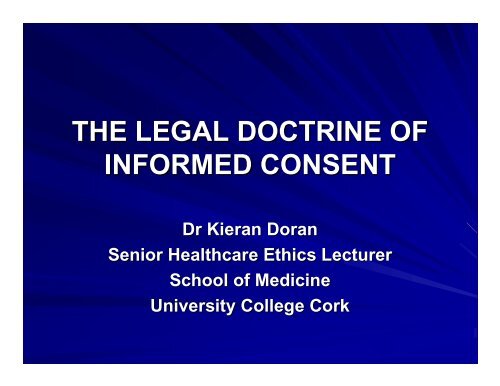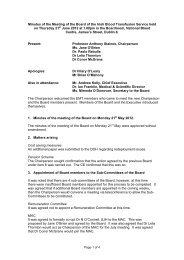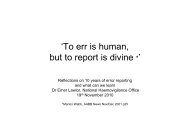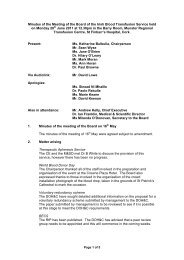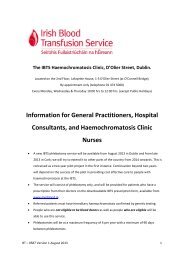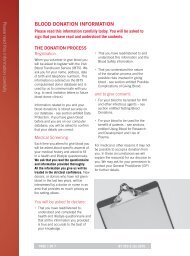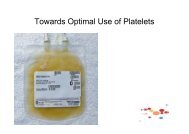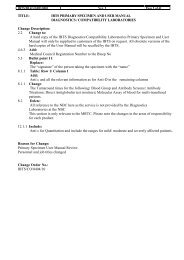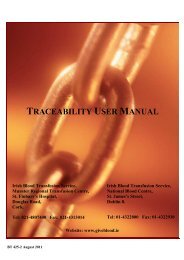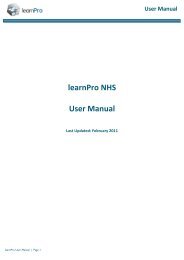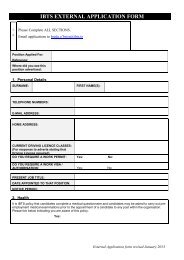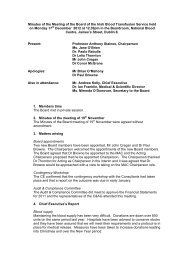Consent to transfusion - Irish Blood Transfusion Service
Consent to transfusion - Irish Blood Transfusion Service
Consent to transfusion - Irish Blood Transfusion Service
Create successful ePaper yourself
Turn your PDF publications into a flip-book with our unique Google optimized e-Paper software.
THE LEGAL DOCTRINE OF<br />
INFORMED CONSENT<br />
Dr Kieran Doran<br />
Senior Healthcare Ethics Lecturer<br />
School of Medicine<br />
University College Cork
THE LEGAL DOCTRINE OF<br />
INFORMED CONSENT:<br />
THE BASIC PRINCIPLES<br />
The Ethical and Professional Principle<br />
of Patient Au<strong>to</strong>nomy in Law<br />
“Every human being of adult years and sound<br />
mind has a right <strong>to</strong> determine what shall be<br />
done with his own body; and a Surgeon who performs<br />
an operation without the Patient’s <strong>Consent</strong> commits an<br />
Assault.”<br />
Schloendorff v Society of New York Hospital<br />
[1914] 211 NY 125
THE LEGAL DOCTRINE OF<br />
INFORMED CONSENT:<br />
THE BASIC PRINCIPLES<br />
The Constitutional Principle of<br />
Personal Au<strong>to</strong>nomy and Bodily Integrity<br />
In Re Ward of Court<br />
(Withholding of Medical Treatment) No 2<br />
[1996] 2 IR 79<br />
Article 40.3.1<br />
“The State guarantees in its laws <strong>to</strong> respect, and as far<br />
as is reasonably practicable, by its laws <strong>to</strong> defend and<br />
vindicate the personal rights of the <strong>Irish</strong> Citizen.”
THE LEGAL DOCTRINE OF<br />
INFORMED CONSENT:<br />
THE BASIC PRINCIPLES<br />
The Constitutional Principle of<br />
Personal Au<strong>to</strong>nomy and Bodily Integrity<br />
In Re Ward of Court<br />
(Withholding of Medical Treatment) No 2<br />
[1996] 2 IR 79<br />
Article 40.3.2<br />
“The State is obliged <strong>to</strong> by its laws <strong>to</strong> protect as best it<br />
may from unjust attack and, in the case of injustice<br />
done, vindicate the life, person, good name and<br />
property rights of every citizen.”
THE LEGAL DOCTRINE OF<br />
INFORMED CONSENT:<br />
THE BASIC PRINCIPLES<br />
The Constitutional Principle of<br />
Personal Au<strong>to</strong>nomy and Bodily Integrity<br />
Fitzpatrick v K [2008] IEHC 104<br />
Mr Justice Laffoy<br />
“A competent Adult is free <strong>to</strong> reject Medical<br />
Advice or decline Medical Treatment.”
THE LEGAL DOCTRINE OF<br />
INFORMED CONSENT:<br />
THE BASIC PRINCIPLES<br />
The Legislative Principle of Au<strong>to</strong>nomy and<br />
Freedom of Religious Belief<br />
S. 4 (1) of the Health Act 1953:<br />
“Nothing in this Act or any instrument hereunder shall<br />
be construed as imposing an obligation on any person<br />
<strong>to</strong> avail himself or any service provided under this Act<br />
or <strong>to</strong> submit himself or any person for whom he is<br />
responsible <strong>to</strong> health examination or treatment.”
THE LEGAL DOCTRINE OF<br />
INFORMED CONSENT:<br />
THE BASIC PRINCIPLES<br />
The Legislative Principle of Au<strong>to</strong>nomy and<br />
Freedom of Religious Belief<br />
S. 4 (2) of the Health Act 1953:<br />
“Any person who avails himself of any service<br />
provided under this Act shall not be under any<br />
obligation <strong>to</strong> submit himself or any person for whom<br />
he is responsible <strong>to</strong> a health examination or treatment<br />
which is contrary <strong>to</strong> the teaching of his religion.”
THE LEGAL DOCTRINE OF<br />
INFORMED CONSENT:<br />
THE BASIC PRINCIPLES<br />
The Legislative Principle of Au<strong>to</strong>nomy and<br />
Freedom of Religious Belief<br />
Ss 4 (1) and (2) of the Health Act 1953<br />
Approved by the Supreme Court in the case of<br />
North Western Health Board v W (H) [2001] 3 IR 622
THE LEGAL DOCTRINE OF<br />
INFORMED CONSENT:<br />
THE KEY ELEMENTS<br />
The Tort of Battery;<br />
Defence <strong>to</strong> the Tort of Battery:<br />
Informed <strong>Consent</strong>;<br />
Express <strong>Consent</strong>;<br />
Implied <strong>Consent</strong>;<br />
Standard of Care in Informed <strong>Consent</strong>;<br />
Causation in Informed <strong>Consent</strong>;<br />
Exceptions <strong>to</strong> the Legal Doctrine of<br />
Informed <strong>Consent</strong>.
THE LEGAL DOCTRINE OF<br />
INFORMED CONSENT:<br />
THE TORT OF BATTERY<br />
The Tort of Battery is committed by intentionally<br />
bringing about a harmful or offensive contact with<br />
the person of the Patient. It represents the<br />
importance of the individual Patient’s right <strong>to</strong><br />
determine what should or should not be done <strong>to</strong><br />
his/her body, and this includes any bodily <strong>to</strong>uching<br />
of the person of the Patient without his/her<br />
<strong>Consent</strong>.
THE LEGAL DOCTRINE OF<br />
INFORMED CONSENT:<br />
THE TORT OF BATTERY<br />
The Tort of Battery is also a potential action<br />
Where there has been a particularly egregious<br />
defect in warning the Patient, such that it<br />
amounts <strong>to</strong> misleading the Patient about a key<br />
ingredient of the proposed Medical Procedure<br />
or Treatment. It may contain the following<br />
elements:
THE LEGAL DOCTRINE OF<br />
INFORMED CONSENT:<br />
THE TORT OF BATTERY<br />
Failure <strong>to</strong> Disclose the nature of the<br />
Medical Procedure or Treatment<br />
(R v Williams [1923] 1 KB 340)<br />
Failure <strong>to</strong> Disclose Lack of Qualifications<br />
(R v Tabassum [2000] 2 CR App Rep 328 &<br />
R v Richardson 43 BMLR 21)<br />
Carrying out an Unnecessary Medical Procedure<br />
(Apple<strong>to</strong>n v Garrett 34 BMLR 23)
THE LEGAL DOCTRINE OF<br />
INFORMED CONSENT:<br />
THE TORT OF BATTERY<br />
Daniels v Heskin [1954] IR 73<br />
“ All depends on the circumstances, the<br />
character of the Patient, her health, her social<br />
position, her intelligence, the nature of the<br />
tissue in which the needle was embedded<br />
Here the Patient was passing through a post<br />
partum period in which the possibility of<br />
nervous or mental disturbance is no<strong>to</strong>rious.”
THE LEGAL DOCTRINE OF<br />
INFORMED CONSENT:<br />
THE TORT OF BATTERY<br />
Malette v Schulman [1988] 47 DLR 8<br />
If the Patient does not give, or fails <strong>to</strong> give,<br />
his/her <strong>Consent</strong> <strong>to</strong> the proposed treatment<br />
or procedure, and it is subsequently carried out,<br />
then the constituent elements of the Tort of<br />
Battery are present.
THE LEGAL DOCTRINE OF<br />
INFORMED CONSENT:<br />
THE TORT OF BATTERY AND ASSAULT<br />
Walsh v Family Planning <strong>Service</strong>s [1992] 1 IR 496<br />
Where there is no Informed <strong>Consent</strong> acquired by the<br />
Medical Practitioner from the Patient or the Medical<br />
Practitioner negligently fails <strong>to</strong> get an Informed<br />
<strong>Consent</strong> from the Patient, then a claim for Assault<br />
under the Criminal Law can arise.
THE LEGAL DOCTRINE OF<br />
INFORMED CONSENT:<br />
THE TORT OF BATTERY AND ASSAULT<br />
Reibl v Hughes [1980] 114 DLR 1<br />
A claim for Assault under the Criminal Law should be<br />
confined <strong>to</strong> cases where there is no Informed <strong>Consent</strong><br />
<strong>to</strong> the particular procedure and it was feasible for the<br />
Medical Practitioner <strong>to</strong> acquire the Informed <strong>Consent</strong><br />
from the Patient.
THE LEGAL DOCTRINE OF<br />
INFORMED CONSENT:<br />
DEFENCE TO THE TORT OF BATTERY<br />
The Defence of <strong>Consent</strong> allows a Medical<br />
Practitioner <strong>to</strong> come in<strong>to</strong> contact with the person of<br />
the Patient without fear of committing the Tort of<br />
Battery. . To be effective:<br />
<strong>Consent</strong> must be freely given;<br />
Patient must be capable of giving <strong>Consent</strong>; and<br />
Patient’s consent must be an Informed <strong>Consent</strong>, i.e.<br />
the Patient must have the required information about the<br />
nature of the proposed treatment or procedure.
THE LEGAL DOCTRINE OF<br />
INFORMED CONSENT:<br />
DEFENCE TO THE TORT OF BATTERY<br />
Chatter<strong>to</strong>n v Gerson [1981] 1QB 431<br />
A Patient will only succeed in a Claim for the<br />
Tort of Battery if the <strong>Consent</strong> is not real, , and<br />
the Claim will fail if the Medical Practitioner has<br />
informed him/her in general terms as <strong>to</strong> the<br />
nature and the risks involved in the proposed<br />
procedure.
THE LEGAL DOCTRINE OF<br />
INFORMED CONSENT:<br />
DEFENCE TO THE TORT OF BATTERY<br />
Siddaway Bethlem Royal Hospital<br />
[1985] 1 AC 871<br />
<strong>Consent</strong> is not negated by a failure on the part of the Medical<br />
Practitioner <strong>to</strong> give the Patient sufficient information.<br />
However, it is not a proper <strong>Consent</strong> if it is obtained from the PatientP<br />
through fraud or misrepresentation on the part of the<br />
Medical Practitioner.<br />
The question <strong>to</strong> be asked is not whether sufficient information had h<br />
been disclosed <strong>to</strong> the Patient by the Medical Practitioner <strong>to</strong> enable<br />
them <strong>to</strong> make an Informed <strong>Consent</strong>.
THE LEGAL DOCTRINE OF<br />
INFORMED CONSENT:<br />
DEFENCE TO THE TORT OF BATTERY<br />
Siddaway v Bethlem Royal Hospital<br />
[1985] 1 AC 871<br />
Instead, the issue <strong>to</strong> be addressed is whether<br />
or not a PRUDENT Medical Practitioner<br />
would have acted as the Defendant Medical<br />
Practitioner has done in releasing only certain<br />
amount of information <strong>to</strong> the Plaintiff Patient.
THE LEGAL DOCTRINE OF<br />
INFORMED CONSENT:<br />
DEFENCE TO THE TORT OF BATTERY<br />
Walsh v Family Planning <strong>Service</strong>s<br />
[1992] 1 IR 496<br />
The Tort of Battery will only be held <strong>to</strong> have<br />
been committed in the event that there is no<br />
Informed <strong>Consent</strong> <strong>to</strong> the proposed procedure<br />
given by the Patient, and that it was feasible <strong>to</strong><br />
look for and obtain the Patient’s Informed<br />
<strong>Consent</strong>.
THE LEGAL DOCTRINE OF<br />
INFORMED CONSENT:<br />
EXPRESS CONSENT<br />
Express <strong>Consent</strong> is given when the Patient<br />
clearly states that he/she is willing <strong>to</strong> go ahead<br />
with the proposed procedure. This can take the<br />
form of a verbal discussion in which the Medical<br />
Practitioner explains the benefits <strong>to</strong> be expected<br />
and the risks <strong>to</strong> be incurred when opting for the<br />
proposed procedure. It can, and should where<br />
possible, be given in writing, i.e. a <strong>Consent</strong> Form.
THE LEGAL DOCTRINE OF<br />
INFORMED CONSENT:<br />
IMPLIED CONSENT<br />
Implied <strong>Consent</strong> is given many times in general clinical<br />
practice. It extends <strong>to</strong> the realms of examination,<br />
investigation, and treatment.<br />
An example of this is where the Patient holds out his/her<br />
arm in preparation for a blood sample being taken by a<br />
Medical Practitioner.<br />
Similarly, a Patient who takes a prescription from a<br />
Medical Practitioner and then visits the Pharmacy is<br />
consenting <strong>to</strong> the course of medication prescribed.
THE LEGAL DOCTRINE OF<br />
INFORMED CONSENT:<br />
THE STANDARD OF CARE IN<br />
INFORMED CONSENT<br />
Medical Paternalism v<br />
Patient Self-Determination<br />
Medical Judgement v<br />
Patient’s Right <strong>to</strong> Know
THE LEGAL DOCTRINE OF<br />
INFORMED CONSENT:<br />
THE STANDARD OF CARE IN<br />
INFORMED CONSENT<br />
There is a balance <strong>to</strong> be struck between the<br />
benefits of the proposed procedure for the<br />
Patient, and the risk of any potential side<br />
effects. . The Medical Practitioner owes the Patient<br />
a Duty of Care <strong>to</strong> ensure the right balance is<br />
struck in this regard, as his/her clinical decision(s)<br />
will directly affect the Patient.
THE LEGAL DOCTRINE OF<br />
INFORMED CONSENT:<br />
THE STANDARD OF CARE IN<br />
INFORMED CONSENT<br />
A Medical Practitioner is not negligent in obtaining the Patient’s<br />
Informed <strong>Consent</strong> if he/she only discloses the risks that would have<br />
been mentioned by a responsible Body of Medical Opinion.<br />
The Court has <strong>to</strong> be satisfied that there is a logical basis <strong>to</strong> the<br />
approach adopted by the Responsible Body of Medical Opinion in<br />
question.<br />
A Medical Practitioner is under a Duty of Care <strong>to</strong> provide the Patient<br />
with the information necessary <strong>to</strong> enable the Patient <strong>to</strong> make a<br />
balanced judgement regarding the proposed treatment or procedure,<br />
and hence give an Informed <strong>Consent</strong> <strong>to</strong> the Medical Practitioner.
THE LEGAL DOCTRINE OF<br />
INFORMED CONSENT:<br />
THE STANDARD OF CARE IN<br />
INFORMED CONSENT<br />
Siddaway v Bethelehem Royal Hospital<br />
[1985] 1 AER 871<br />
A Medical Practitioner is not Negligent in obtaining a<br />
Patient’s <strong>Consent</strong> if he/she only discloses the risk that<br />
would have been mentioned by a Responsible Body of<br />
Medical Opinion.<br />
A Medical Practitioner is under a duty <strong>to</strong> provide the<br />
Patient with the information necessary <strong>to</strong> make a<br />
balanced judgement regarding the proposed treatment<br />
or procedure.
THE LEGAL DOCTRINE OF<br />
INFORMED CONSENT:<br />
THE STANDARD OF CARE IN<br />
INFORMED CONSENT<br />
Canterbury v Spence<br />
[1972] 464 F 2d 772<br />
A Patient of adult years and sound mind has a right <strong>to</strong><br />
determine what shall be done with his/her body.<br />
It is the Medical Practitioner’s duty <strong>to</strong> warn of any risks<br />
in the proposed treatment or procedure and <strong>to</strong> give the<br />
information <strong>to</strong> which the Patient is entitled. The test for<br />
determining whether a risk should be divulged is its<br />
“Materiality”.
THE LEGAL DOCTRINE OF<br />
INFORMED CONSENT:<br />
THE STANDARD OF CARE IN<br />
INFORMED CONSENT<br />
Canterbury v Spence<br />
[1972] 464 F 2d 772<br />
A risk is considered “Material” if a<br />
reasonable person, from what the Medical<br />
Practitioner knows or should know <strong>to</strong> be the<br />
Patient’s position, would be likely <strong>to</strong> attach<br />
significance <strong>to</strong> that risk when reaching his/her<br />
decision re: the proposed treatment or<br />
procedure.
THE LEGAL DOCTRINE OF<br />
INFORMED CONSENT:<br />
THE STANDARD OF CARE IN<br />
INFORMED CONSENT<br />
Rogers v Whitaker<br />
[1992] 67 ALJR 47<br />
While the accepted Medical Practice of a<br />
Responsible Body of Medical Opinion is a<br />
useful guide for the Court <strong>to</strong> use, the Court itself<br />
is <strong>to</strong> be guided by the appropriate Standard of<br />
Care that gives weight <strong>to</strong> the paramount<br />
consideration namely that a Patient is entitled <strong>to</strong><br />
make decisions about any proposed treatment<br />
or procedure.
THE LEGAL DOCTRINE OF<br />
INFORMED CONSENT:<br />
THE STANDARD OF CARE IN<br />
INFORMED CONSENT<br />
Rogers v Whitaker<br />
[1992] 67 ALJR 47<br />
A Medical Practitioner would breach his/her duty if<br />
he/she failed <strong>to</strong> warn a Patient of a Material Risk<br />
inherent in the proposed treatment or procedure.<br />
A “Material Risk” is defined as one that a reasonable<br />
person in the Patient’s position, if warned of the risk,<br />
would be likely <strong>to</strong> attach significance <strong>to</strong> it.
THE LEGAL DOCTRINE OF<br />
INFORMED CONSENT:<br />
THE STANDARD OF CARE IN<br />
INFORMED CONSENT<br />
Walsh v Family Planning <strong>Service</strong>s<br />
[1992] 1 IR 496<br />
A prudent Medical Practitioner will disclose all<br />
the relevant facts in an operation governing Sexual<br />
Capacity. The Court needs <strong>to</strong> know the following:<br />
• The Medical Practitioner’s judgement as <strong>to</strong> the<br />
consequences of disclosure <strong>to</strong> the Patient, and<br />
• The accepted Medical Practice in such<br />
circumstances.
THE LEGAL DOCTRINE OF<br />
INFORMED CONSENT:<br />
THE STANDARD OF CARE IN<br />
INFORMED CONSENT<br />
Walsh v Family Planning <strong>Service</strong>s<br />
[1992] 1 IR 496<br />
In Elective Procedures, , such as a Vasec<strong>to</strong>my,<br />
there is a duty on the part of the Medical<br />
Practitioner <strong>to</strong> warn the Patient, despite the<br />
statistically negligible chance of any<br />
complication arising such as Orichalgia which<br />
emerged in the post Elective Procedure period.
THE LEGAL DOCTRINE OF<br />
INFORMED CONSENT:<br />
THE STANDARD OF CARE IN<br />
INFORMED CONSENT<br />
Geoghegan v Harris (High Court 21 June 2000)<br />
A more recent case before the High Court on the issue of pre-treatment<br />
disclosure was where the Plaintiff Patient alleged Negligence in the<br />
carrying out of a dental implant by the Defendant Dentist, during g the<br />
course of which a bone graft was taken from the Plaintiff Patient t ’s chin.<br />
This was alleged <strong>to</strong> have damaged a nerve in the front of the e chin and<br />
left the Patient with chronic neuropathic pain. It was alleged that t<br />
the<br />
Defendnat Dentist failed <strong>to</strong> disclose in advance of the operation the risk<br />
that such pain might be a consequence of the procedure.
THE LEGAL DOCTRINE OF<br />
INFORMED CONSENT:<br />
THE STANDARD OF CARE IN<br />
INFORMED CONSENT<br />
Geoghegan v Harris (High Court 21 st June 2000)<br />
The Defendant Dentist accepted that he did not disclose this risk k as he<br />
was of the view that he had a duty <strong>to</strong> give information about rare<br />
complications where the risk exceeded 1%.<br />
The Defendant Dentist did not consider that this pain was associated<br />
ated<br />
with the proposed procedure. The Plaintiff Patient said that he would not<br />
have undergone the procedure even if the risk was 0.1%. Kearns J., J<br />
having reviewed the cases in this area, observed that whichever<br />
approach was taken <strong>to</strong> determining the standard of disclosure, the e same<br />
conclusion was reached as regards the most critical elements, namely:
THE LEGAL DOCTRINE OF<br />
INFORMED CONSENT:<br />
THE STANDARD OF CARE IN<br />
INFORMED CONSENT<br />
Geoghegan v Harris (High Court 21 June 2000)<br />
The requirement <strong>to</strong> give a warning of any Material Risk<br />
which is a known complication of a course of treatment or<br />
clinical procedure properly carried out; and<br />
The test of Materiality in Elective Procedures is <strong>to</strong> enquire<br />
whether there is any risk, however exceptional or remote, of<br />
grave consequences involving pain for an appreciable time<br />
in<strong>to</strong> the future. The statistical frequency of the Material Risk<br />
is irrelevant.
THE LEGAL DOCTRINE OF<br />
INFORMED CONSENT:<br />
CAUSATION IN INFORMED CONSENT<br />
There are three elements <strong>to</strong> Causation in regard<br />
<strong>to</strong> Informed <strong>Consent</strong>:<br />
Was the Patient informed of the potential complication<br />
in respect of the proposed treatment or procedure?<br />
If not, would a Respected Body of Medical Opinion have<br />
informed the Patient of the complication in respect of the<br />
proposed treatment or procedure?<br />
If the Patient had been informed of the potential<br />
complication, would they have gone ahead with<br />
the proposed treatment or procedure?
THE LEGAL DOCTRINE OF<br />
INFORMED CONSENT:<br />
LEGAL EXCEPTIONS TO INFORMED CONSENT<br />
Emergency<br />
Minors<br />
Mental Incompetence
THE LEGAL DOCTRINE OF<br />
INFORMED CONSENT:<br />
LEGAL EXCEPTIONS TO INFORMED CONSENT<br />
EMERGENCY<br />
Marshall v Curry [1933] 3 DLR 260<br />
Parmley v Parmley & Yule [1945] 4 DLR 81<br />
Murray v McMurchy [1949] 2 DLR 442
THE LEGAL DOCTRINE OF<br />
INFORMED CONSENT:<br />
LEGAL EXCEPTIONS TO INFORMED CONSENT<br />
MINORS<br />
W v W [1972] AC 24<br />
Gillick v West Norfolk & Wisbech AHA [1985] 402<br />
In Re R [1991] 4 AER 177<br />
North Western Health Board v W (H) [2001] 3 IR 622<br />
Non-Offences Against the Person Act 1997<br />
Child Care Act 1991
THE LEGAL DOCTRINE OF<br />
INFORMED CONSENT:<br />
LEGAL EXCEPTIONS TO INFORMED CONSENT<br />
MENTAL INCOMPETENCE<br />
In Re F [1990] 2 AC 1<br />
In Re C [1994] 1 WLR 29<br />
In Re Ward of Court [1996] 2 IR 73<br />
Fitzpatrick v K [2008] IEHC 104
THE LEGAL DOCTRINE OF<br />
INFORMED CONSENT:<br />
RECENT DEVELOPMENTS IN IRISH LAW<br />
CASE LAW<br />
Fitzpatrick v Eye and Ear Hospital<br />
[2007] Unreported Supreme Court<br />
“The Patient-Centred Test is preferable, and ultimately<br />
more satisfac<strong>to</strong>ry from the point of view of both Doc<strong>to</strong>r<br />
and Patient alike, than any Doc<strong>to</strong>r-Centred approach<br />
favoured by the Supreme Court in Walsh v Family<br />
Planning <strong>Service</strong>s.”
THE LEGAL DOCTRINE OF<br />
INFORMED CONSENT:<br />
RECENT DEVELOPMENTS IN IRISH LAW<br />
CASE LAW<br />
Fitzpatrick v Eye and Ear Hospital<br />
[2007] Unreported Supreme Court<br />
“There are obvious reasons why in the context of<br />
elective surgery a warning given only shortly before an<br />
operation is undesirable. A Patient may be stressed,<br />
medicated or in pain in the period and may be less<br />
likely for one or more of these reasons <strong>to</strong> make a calm<br />
as well as reasoned decision in such circumstances.”
THE LEGAL DOCTRINE OF<br />
INFORMED CONSENT:<br />
RECENT DEVELOPMENTS IN IRISH LAW<br />
CASE LAW<br />
In Re K<br />
[2007] Unreported Supreme Court<br />
This case approved the ratio in the case of In<br />
Re Ward of Court adjudicated on in the<br />
Supreme Court in 1995. The ratio being that<br />
Medical Treatment may not be given <strong>to</strong> an<br />
Adult Person of full capacity without his/her<br />
<strong>Consent</strong>.
THE LEGAL DOCTRINE OF<br />
INFORMED CONSENT:<br />
RECENT DEVELOPMENTS IN IRISH LAW<br />
CASE LAW<br />
In Re K<br />
[2007] Unreported Supreme Court<br />
However the Court also accepted the ratio in<br />
the case of At<strong>to</strong>rney-General v X [1992] 1 IR 1<br />
that a Mother’s Personal Au<strong>to</strong>nomy is limited<br />
where there is a conflict with the legal rights of<br />
the foetus.
THE LEGAL DOCTRINE OF<br />
INFORMED CONSENT:<br />
RECENT DEVELOPMENTS IN IRISH LAW<br />
CASE LAW<br />
In Re K<br />
[2007] Unreported Supreme Court<br />
According <strong>to</strong> Justice Hederman in the Supreme Court:<br />
“There is no legal recognition of a Mother’s Right of<br />
Self-Determination which can give priority over the<br />
protection of unborn life. The creation of a new life,<br />
involving as it does pregnancy, birth and raising a<br />
child, necessarily involves some restriction of a<br />
Mother’s freedom of Self-Determination.”
LEGISLATION<br />
THE LEGAL DOCTRINE OF<br />
INFORMED CONSENT:<br />
RECENT DEVELOPMENTS<br />
The Power of At<strong>to</strong>rney Act 1996<br />
Future Legislation<br />
Mental Capacity Bill 2008<br />
Advanced Directives/Living Wills
THE LEGAL DOCTRINE OF<br />
INFORMED CONSENT<br />
THANK YOU!<br />
Dr Kieran Doran<br />
Senior Healthcare Ethics Lecturer<br />
School of Medicine<br />
University College Cork<br />
(021) 4901513<br />
K.Doran@ucc.ie


